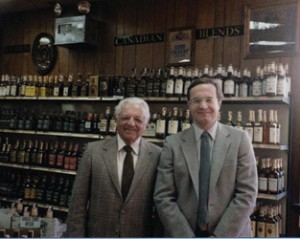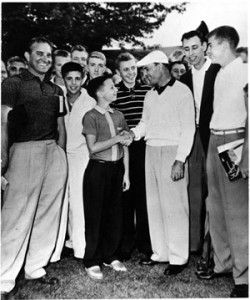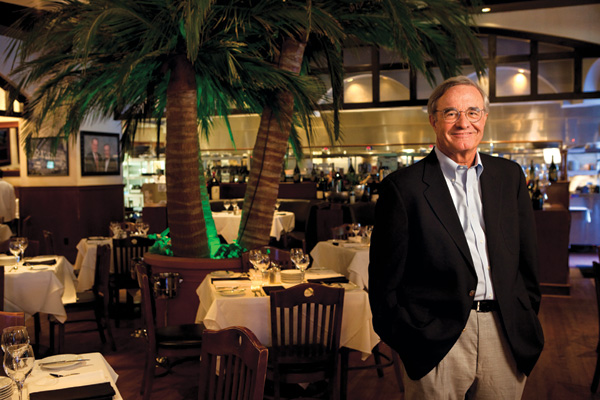
Jerry Greenbaum (BBA '62), photographed at New York Prime in Atlanta, one of 20 restaurants he owns and operates through CentraArchy Restaurant Management Co.
By Mark Miester
“You want to get something to drink?”
It’s a little after 5:30 p.m. on a balmy summer afternoon and Jerry Greenbaum has been going nonstop all day. After flying his Cessna Citation from Atlanta to New Orleans in the morning, he spent the early afternoon interviewing prospective architects for the new restaurant he’s developing and the late afternoon being interviewed for an alumni magazine profile. He’s ready for happy hour, but for Greenbaum, the line between work and play isn’t just unclear. It apparently doesn’t exist.
From the lobby of his hotel in the Warehouse District, we stroll up Julia Street to a restaurant across from the Riverwalk and take a couple of seats at the bar. The bartender, who looks barely old enough to drink himself, places two white cocktail napkins in front of us.
“I want a scotch and soda,” Greenbaum says.
“For your scotch, sir, we have Dewar’s, Chivas or Glenlivet.”
Greenbaum tilts his head back and eyes the bartender through his glasses.
“Which one is happy hour?”
“Pardon?”
“What is it? Two for one?”
“I’m sorry, sir. We don’t have a happy hour.”
“Okay,” Greenbaum cheerfully replies. “Give me a Dewar’s and soda.”
When the bartender leaves, Greenbaum leans over to me. “I was trying to figure out what they do for promotions,” he says with a chuckle. “I told you I’m always working.”
Jerry Greenbaum doesn’t have to work anymore. As chairman of the Greenbaum Companies, a loose confederation of family-owned businesses that includes liquor stores, warehouses and restaurants, he long ago ceded the day-to-day operation of the companies to his children. Since 1996, when his son Greg “fired” him (more about that later), Greenbaum has spent most of his time on the golf course, where he competes in tournaments as one of the nation’s top senior amateur golfers.
In recent months, however, Greenbaum hasn’t been playing much golf. Instead, he’s been back at work, meeting with vendors and contractors as he oversees the development of his latest—and most ambitious—restaurant.
After more than 10 years searching for the right opportunity, Greenbaum is finally realizing his dream of opening a restaurant in New Orleans. In May, he purchased the former Dixie Machine, Welding and Metal Works building in the Warehouse District, and he plans to convert the sprawling, historic structure into a 10,000 square foot restaurant with seating for 300. The still-unnamed restaurant will be a high-end, white-tablecloth steakhouse serving exclusively USDA Prime beef as well as fresh Gulf seafood. The target date for opening is fall 2011.
“We felt like New Orleans was underserved for high-quality, high-end steakhouses,” Greenbaum says. “We’ve had some success with that in other markets, and we think we’ll have success here.”
Greenbaum has come out of retirement to work on special projects in the past, most notably opening a location of the company’s New York Prime steakhouse chain in Boca Raton, Fla., but opening a restaurant in New Orleans—the city where Greenbaum met his wife, Barbara, and first became acquainted with fine dining—makes this special project a little more special than most. Not only will it be the largest restaurant he’s ever developed, it will probably end up being the last restaurant he takes a personal interest in.
“New Orleans is our second home and we plan to spend a lot of our later years here watching after this restaurant,” Greenbaum says. “We’re going to buy a home here to spend most of the spring and fall. I told Barbara we started in New Orleans and we’ll probably wind up finishing here.”
.

Since resuming competitive play in 1996, Greenbaum has won more than 50 events on the Senior Amateur tour and been ranked as high as No. 2 in the world by Golfweek.
DESPITE THE LARGE role New Orleans has played in his life and career, Jerry Greenbaum first arrived in the city almost by chance. To this day, he can’t remember exactly why he decided to attend Tulane.
“I was young and it sounded like a good idea,” he says. “I didn’t even come down here for a visit.”
As it turned out, a visit wasn’t necessary.
To say New Orleans life appealed to the Atlanta native is an understatement. It was love at first bite.
“I came to Tulane eating practically nothing but grilled cheese sandwiches and plain hamburgers,” he says. “After one year in New Orleans, I’m eating snails and oysters and crabmeat and crawfish and all that stuff. My mother thought I was crazy.”
The food was certainly an attraction. Every Sunday night Greenbaum and about 20 of his Sigma Alpha Mu fraternity brothers would have dinner at Galatoire’s. When somebody’s parents came to town, the destination was Antoine’s. But Greenbaum’s affection for the city was about more than just food.
“New Orleans gave me an appreciation for the better things in life,” he says. “There’s a style of living that exists in New Orleans that you won’t find anywhere else. People here are more relaxed. It’s a fun place. You walk into a bar and all of a sudden everybody knows you. It’s just a neat town.”
When Greenbaum graduated from Tulane, he assumed he’d eventually get a job with a big company and climb the corporate ladder. Two years in the Army convinced him that the last thing he wanted to do was be part of a big bureaucracy. Without a clear idea of what he wanted to do and with no expectation of making it his career, Greenbaum returned to Atlanta in 1964 and started working for his father at the family liquor store.
The son of Latvian immigrants, Leonard Greenbaum had opened Green’s Liquor Store on Ponce de Leon Avenue in 1937, shortly after the end of Prohibition, and over time he grew the store into a modest but successful business built on low prices and high volume. In the late 1950s, he added real estate to the mix, building a number of commercial warehouses around Atlanta.
At the liquor store, Jerry unloaded boxes, stocked shelves, worked the cash register and swept the floor. It wasn’t glamorous, but it was a job and it was bureaucracy free.
Jerry had been working for his father for only a few months when Leonard Greenbaum called him into his office and told him he was ready to hand over the reins. The elder Greenbaum said he would help Jerry learn the business for six months, but after that he would be on his own.
“That was one liquor store doing three quarters of a million dollars with about five or six employees, but still it was a big move on my dad’s part,” Greenbaum says. “It gave me confidence. I started running the business and he basically bowed out. He let me make the decisions, even though I made some decisions he didn’t like.”
One of those decisions was to expand the company. At the time, much of Green’s sales came from customers in neighboring DeKalb, a dry county. With a family to support—by that time he had married his college sweetheart, the former Barbara Axelrod (N ’63), and had a young son—Greenbaum worried that the legalization of alcohol sales in DeKalb would be devastating to Green’s bottom line.
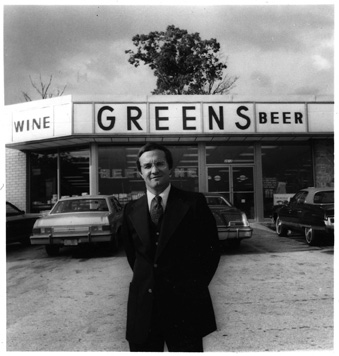
Greenbaum in front of the second location of Green's Liquor Store, which he opened on Buford Highway in Atlanta in 1971.
Against the wishes of his father, who was happy with one store, Greenbaum went ahead with plans to expand. After an early false start, he opened a store on Buford Highway in Atlanta in 1971. Slashing margins to 15 percent—the industry average is around 25 percent—Greenbaum transformed Green’s into a beverage alcohol superstore. Today, the five Green’s Discount Beverage Stores—the original two stores in Atlanta and three locations in South Carolina—generate almost $75 million in annual sales, more than 25 times the industry average on a per-store basis.
“We’re the Costco or Sam’s Club of alcoholic beverages,” Greenbaum says. “No gimmicks, no rebates. We just sell it at the cheapest price we can sell it all the time.”
IN 1983, WHILE scouting sites in Columbia, S.C., for what would be the last of his five liquor stores, Greenbaum came across an old train station that he thought would make a great location for a restaurant. Laws in Georgia and South Carolina restricted the number of liquor stores a single owner could have, and Greenbaum had reached his limit. Despite no experience other than being an avid diner, Greenbaum decided to branch out into the restaurant business. Partnering with a former Houston’s kitchen manager, he established California Dreaming, an upscale casual restaurant serving sandwiches, seafood and steaks.
“I budgeted a million and a half dollars, and it wound up costing $3.6 million,” Greenbaum laughs. “Shows you how much I knew about estimating the cost of building something.”
For a businessman whose strategy had always been to minimize risk, the prospect of losing $2 million on an investment was almost unthinkable. Greenbaum couldn’t let it fail.
“I worked the floor, six days a week, lunch and dinner, and made sure every customer in that restaurant had a good experience,” Greenbaum says. “If they had a bad experience, we corrected it, either with a gift certificate or something else. But we didn’t have many bad experiences.”
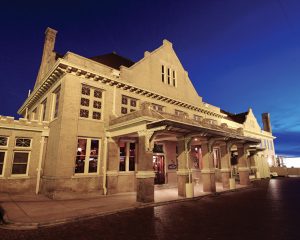
Greenbaum restored an old train depot in Columbia, S.C., to be the home of California Dreaming, above, his first restaurant project. Today Greenbaum owns and operates 20 restaurants across the Southeast.
California Dreaming was the first of what would grow into a group 20 restaurants developed by CentraArchy, Greenbaum’s restaurant management company. In addition to 10 locations of California Dreaming in Georgia, South Carolina and Florida, the company operates Lenox Square Grill, the Tavern at Phipps and Joey D’s Oak Room in Atlanta; Carolina Roadhouse and Burro Loco in Myrtle Beach, S.C.; Gulf Stream Café in Garden City, S.C.; and San Antonio’s in Charlotte, N.C. The company also operates four high-end steakhouses, three under the name New York Prime and one under the name Chophouse ’47.
All together, the restaurants employ 2,000 people and generate about $100 million in annual revenues.
“I love the creativity of opening new restaurants,” Greenbaum says. “I’ve never been a real good manager. I’m better at starting things and getting them up and running. Basically my responsibility with the company is to go find new locations and help put the new projects together.”
What makes his restaurant business that much more remarkable is that Greenbaum has built all his units with no debt. Taking a cue from his father, who used profits from the liquor store to build his first warehouse, Greenbaum uses cash generated from the liquor stores, warehouses and other restaurants to fund the startup of each new restaurant, and he only begins developing a new restaurant when he has enough cash on hand to cover construction and startup expenses.
“We don’t need to be the biggest,” Greenbaum says. “We’ve got a great company, and we’re not under any pressure to expand faster than we can expand with our cash flow. I’m old enough now I don’t want to have to worry about going to some bank and saying, ‘Oh, by the way, we didn’t do so good last quarter.’ I sleep really good at night not owing anybody any money.”
.
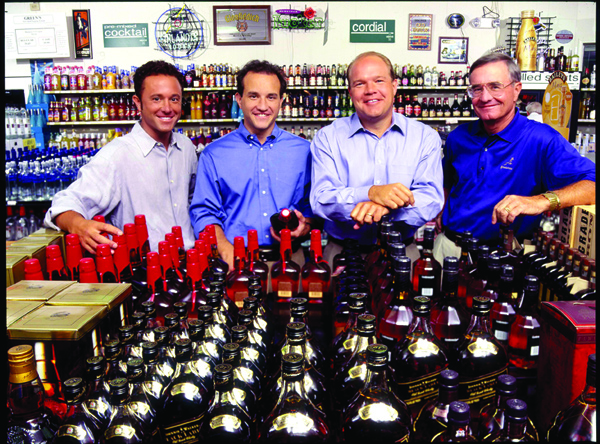
The Greenbaum Companies today are led by Jerry's two sons and his son-in-law. Left to right, Greg Greenbaum, president of the restaurant business, Jeffrey Greenbaum, president of the real estate business, and Lock Reddic, president of the liquor store business.
LIKE HIS FATHER had done with him, Greenbaum wasted little time handing over the reins of the family businesses tohis children. Beginning in the early 1990s, Greenbaum tapped his son Greg to lead the restaurant business, his son Jeffrey to lead the real estate business, and his son-in-law, Lock Reddic, to lead the liquor store business.
“I’m very fortunate to have three children in three different businesses,” Greenbaum says. “They don’t work for each other and they don’t work with each other. It’s really good because they’re all presidents and they’re all good at their individual businesses.”
Which is why, in 1996, Greg Greenbaum decided it was time to fire his father.
Greg had been in the restaurant business for more than 10 years by that point. He started out working at one of his father’s restaurants and then opened two restaurants on his own before merging with his father and becoming vice president of special projects. Jerry still held the title of president, but Greg had opened the company’s last three restaurants with little involvement from his father, who was spending much of his time in Florida playing golf and caring for his aging father.
Greg decided it was time for a change. He called his father into a meeting and explained his vision for the company’s future. He said he saw two people at the top. One would be the president and CEO and run the company. The other would be chairman of the board and play golf all the time.
“I’ll be happy to take either job,” Greg told his father, “but you get first choice.”
Jerry tossed his keys on the table and told his son to call him if he needed him. He’d be on the practice range.
Liberated from the demands of running the day-to-day operations of the company, Greenbaum returned to competitive golf, which he’d given up in 1981 when business demands required him to spend all his energies on the company. Greenbaum started playing golf when he was 9 years old, and by the time he was a teenager, he was winning tournaments. He played in the 1964 U.S. Open as an amateur, making the cut, and seriously considered turning pro before starting his business career.
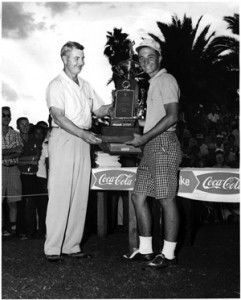
Greenbaum receives the trophy after winning the International Jaycee Junior Golf Tournament in 1958.
.
.
.
.
.
.
.
.
.
.
Since resuming competitive play in 1996, Greenbaum has won more than 50 events on the Senior Amateur tour and been ranked as high as No. 2 in the world by Golfweek. In 2004, he was inducted into the Georgia Golf Hall of Fame.
Another hobby of Greenbaum’s is flying. He started flying for the fun of it, but in no time he was flying from Atlanta to South Carolina to scout locations and oversee new restaurants and liquor stores.
“The plane has really provided me the opportunity to travel and build the company,” he says. “If I hadn’t learned to fly a plane, the company would be less than half the size it is today.”
.
TODAY, JERRY GREENBAUM IS in the comfortable position of being able to do whatever he wants for the company whenever he wants to, and he and Barbara are fully immersed in the New Orleans project. In addition to picking an architect and working with contractors, he’s also developing the menu, which he promises will reflect local tastes. Once the menu is set, Greg Greenbaum will be responsible for putting together a team to deliver the food and service to Jerry’s specifications. As she’s done on all his other restaurants, Barbara will oversee the restaurant’s interior design.
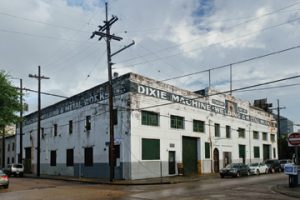
Greenbaum plans to convert the Dixie Machine, Welding & Metal Works building in the Warehouse District into a high-end steakhouse with seating for 300.
“Barbara is an integral part of the business,” Greenbaum says. “I wasn’t around for our family as much as I should have been when I was younger because I was out taking the business to the next level, and she took care of the family, which allowed me to pursue my business career. She’s been an unbelievable support for almost 50 years of marriage, and now she is a most valued consultant for our restaurant projects.”
As we finish an order of shrimp remoulade at the bar—more professional research—I ask Greenbaum if he could imagine working this hard on any other restaurants in the future.
“I could see us doing one like this in Vegas,” he says quickly, but then he pauses.
“In fact I probably won’t get involved in Vegas. I’ve only got so much time. I’ll be in Florida in the winter and here in the spring and fall. This is a great place. I love the people. I love New Orleans. As we get older—I’ll be 70 next year—this looks to me like a good place for an elephant’s graveyard.”

